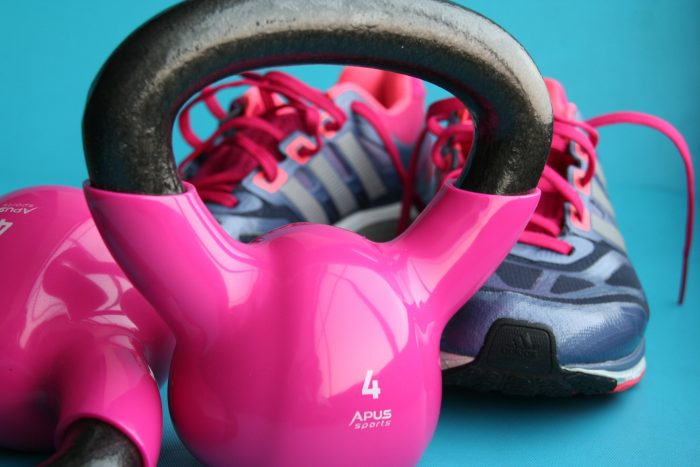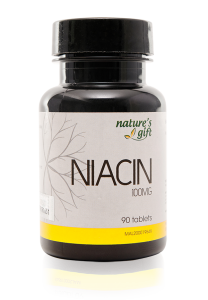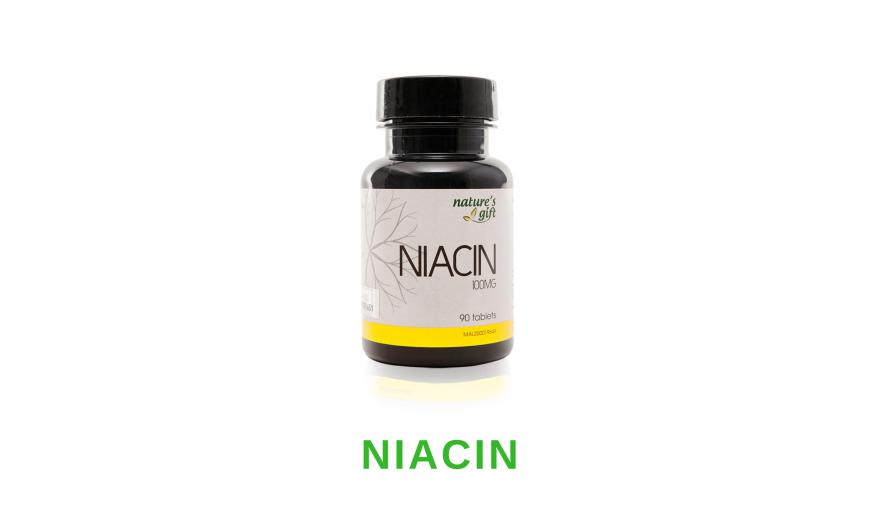Niacin, also known as Vitamin B3, is one of the 8 important B vitamins. All B Vitamins are water-soluble, which means that they dissolve in water and are carried to the tissues of the body. Any excess is flushed out of the body through urination. Therefore, a steady supply and constant replenishment of B Vitamins are required to ensure you are getting enough to meet your body’s needs.
Niacin can be found in meat, poultry, fish, seeds, nuts, legumes and mushrooms. However, Niacin can be easily lost during the cooking process. Hence, people may not usually get enough Niacin from their diet. This is why Niacin supplementation is required.
Forms of Vitamin B3
There are two forms of Vitamin B3; Niacin and Niacinamide. Although both of them have common benefits, ONLY Niacin has been proven to be able to lower cholesterol levels and to be effective in the prevention and treatment of cardiovascular diseases (more details on this below).
Niacin is a vasodilator, it improves the circulation to areas starved of oxygen and nutrients. Within 20-30 minutes of taking Niacin, the blood vessels dilate, and a warm sensation spreads across the body. This sensation is commonly known as the ‘Niacin Flush’ and is similar to the feeling that you get after a good workout. The degree of the flush varies from person to person, and less flush is experienced when taken just after meal. Regardless of the degree of flush one might experience, it does not affect the effectiveness of Niacin for its various therapeutic uses.

Long Term Benefits from Taking Niacin Daily
Niacin has a number of well-researched therapeutic uses. Here are a few of them:
- Detoxification: Niacin possesses the ability to detoxify the bodyfrom xenobiotics (compounds that include drugs, food additives and environmental pollutants) stored in fat cells. There’s added benefit in detoxification and rejuvenation when Niacin is taken just before exercise or sauna.
2. Energy: Niacin deficiency can cause tiredness and fatigue. Regular intake of Niacin has been reported to cause a natural boost in energy.

3. Joint Health: Studies have shown that increased Niacin intake may be linked with decreased levels of joint pain. In addition to this, the inflammation lowering effect of Niacin can help reduce symptoms of arthritis and rebuild cartilage that is crucial for joint mobility and strength.
4. Depression: Many researchers now agree that depression is often caused by inflammation of the nervous system. They also found that Niacin is very effective in treating psychological issues like depression because of its anti-inflammatory effect on the body.
Research on 30,000 men from 50-69 years of age showed a strong link between suicide risk, depression and cholesterol levels. This gives credibility to the hypothesis that lowering cholesterol levels naturally, with the aid of Niacin should lessen symptoms of depression.
5. Fights Dementia and Alzheimer’s Disease: It is alarming to discover that dementia and Alzheimer’s disease are becoming more and more common. The B Vitamins (namely B12, B6, B9 and B3 or Niacin) are among the vitamins that are known to protect memory function.
Intake of Niacin has led to improvements in cognitive tests scores, while deficiency in Niacin can cause dementia and mental confusion. One study found that lower blood levels of Niacin were more common among elderly patients with dementia. A large study published in the Journal of
Neurology, Neurosurgery, and Psychiatry looked at Niacin intake and Alzheimer’s disease in more than 6,000 people. The researchers found that those with the highest total intake of Niacin were much less likely to get Alzheimer’s disease.
6. Prevents Hair Loss: Niacin is an important nutrient for hair growth and it does so in several interesting ways. Because of the increased blood flow to the scalp, it increases and promotes hair growth by bringing in nutrients and removing wastes.

7. Reduces Cholesterol, Triglycerides and Improves Heart Health: Since the 1950s, Niacin has been used to treat high cholesterol. It is very effective in bringing balance to cholesterol levels. It does this by reducing inflammation in the body. As a result of the reduction in inflammation, people with problems with their cholesterol levels experience an increase in HDL levels and reduction in their LDL and triglyceride levels. In addition to reducing LDL levels, it also reduces “very low-density lipoproteins” (VLDL). Increased levels of VLDL have been linked to heart disease and cancer.
The recommended doses of Niacin for high cholesterol are quite high and generally fall in the range of 1 to 6 grams (1,000mg – 6,000mg) daily. When taken at these doses, HDL levels increase, LDL is lowered and the rates of cardiovascular problems in high-risk individuals are decreased.
8. Cancer: According to a research paper published in NCBI (National Centre for Biotechnology Information) of the U.S.A., Niacin has the potential to influence DNA repair, genomic stability and the immune system, thus having an impact on cancer risk, as well as the side effects of chemotherapy.
9. Strengthening the Immune System: Supplementation with niacin also brings benefits for the immune system. Research has shown that regular consumption of niacin leads to a growth in the number of “neutrophils”. These are the white blood cells that help to destroy disease-causing microorganisms such as bacteria and viruses.
Besides that, niacin may help the innate immune system kill antibiotic-resistant staph bacteria by “switching on” some of the disabled anti-microbial genes, giving immune cells greater capacity to kill infectious bacteria.
Word of Caution
High doses of sustained released (SR) Niacin have been linked to acute liver injury. This is the reason why it is not approved for use in high cholesterol treatment.
NewLife Niacin is NOT a SR formula and therefore is safe to consume in high amounts. However, if you have elevated liver functions, please limit the dosage to not more than 500mg daily.
As Niacin is a vasodilator, it causes blood to flow better and faster through the body. Thus, Niacin should not be taken in cases of bleeding or menses. Caution should also be exercised when one is taking blood-thinning medications, as those taking blood thinners have the tendency to bleed internally.

Tips on Increasing the Dosage of Niacin
As mentioned above, it is very common to experience a warm sensation (known as the Niacin Flush) spreading across the body. Some people may be more sensitive to the flushing effect than others and would experience the flush after taking 50mg of Niacin, while someone else might only experience it with 200mg or more.
Rest assure, the Niacin Flush is harmless and tends to last not more than 20 minutes. This reaction wears off as you continue to use B3, so please be patient as you build up a tolerance to it.
However, it is wise to start at low doses (50mg three times daily) and gradually increase this amount on a weekly basis until you get up to your target. Splitting your dose to several times a day or taking Niacin after a meal would also help reduce the flush.
Who Will Benefit from Niacin?
- those who have poor blood circulation
- those who have high cholesterol level
- those who want to build and maintain healthy skin and hair
- people with depression, schizophrenia and other mental illnesses
- those who want a boost in memory power
- those who want to build and maintain a healthy digestive system
- those who want to reverse or slow the aging process
- those with skin problems, including acne, psoriasis and eczema
- those who want a boost in immunity

